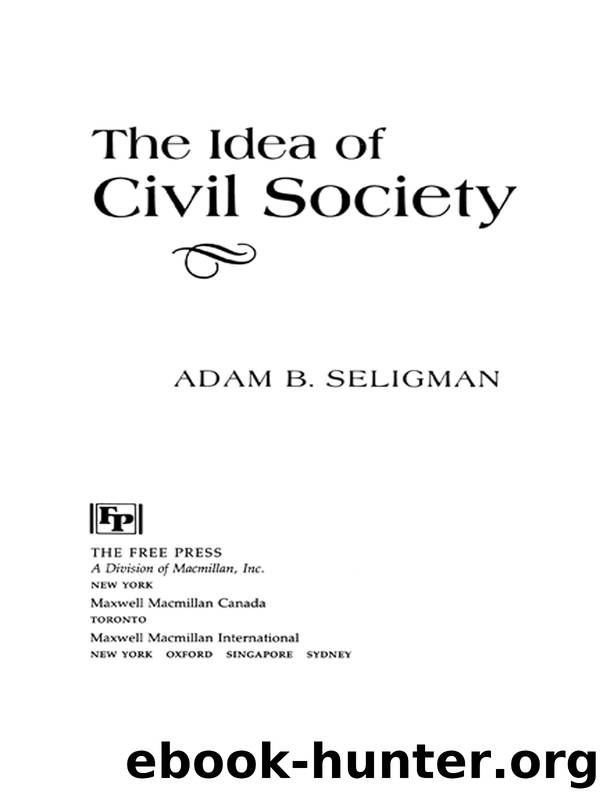Idea of Civil Society by Seligman Adam;

Author:Seligman, Adam;
Language: eng
Format: epub
Publisher: Free Press
Published: 1992-07-14T16:00:00+00:00
This quote, taken from his essay “Individualism and the Intellectuals,” was in fact written in the wake of the Dreyfus Affair, in which Durkheim and his students were heavily involved. For Durkheim, public involvement in this issue was imbued with a “moral seriousness,” as the affair threatened the very universalism of reason and individual rights upon which, for him, the modern terms of social solidarity were based.34
Via Kant, Durkheim harks back to the principles of Reason embodied in the Scottish Enlightenment account of civil society, where “the only moral ways of acting are those which can be applied to all men indiscriminately; that is, which are implied in the general notion of ‘man.’”35 In his appeal to the autonomy of Reason as regulating moral behavior (through perception of the universal moral attributes of each individual), Durkheim in fact emphasizes his debt to eighteenth-century philosophical liberalism, through which he condemns the utilitarianism of the nineteenth century.
Durkheim’s formulations on the precontractual basis of the social order and on the conscience collective can be seen as an attempt to return, in the late nineteenth century, to the formulations of the eighteenth century on natural sympathy and moral sentiment as the core of the social order or, in the earlier formulation, civil society. Durkheim attempts to “save” that social component of individual identity which, while present in the eighteenth-century idea of civil society, was lost in nineteenth-century utilitarian theory. In this context it is not surprising to find in Durkheim’s more explicitly political positions an advocacy of intermediary bodies—occupational and professional groups—standing between the individual and the State. That is precisely those type of corporate groups which the Loi le Chappelier had sought to outlaw as inimical to the principle of individual autonomy but for Durkheim were the only guarantee of social solidarity among otherwise atomized individuals.36 It was for Durkheim only in these modern “guild” type of organizations that moral authority could exist in a society governed by the individualistic ethic. For these groups “like every group formed of individuals united by ties of interest, ideas and feelings, is capable of being a moral force over the members who comprise it.”37 Here too we find echoes of Hegel’s definition of civil society as a realm existing between the family and the State—with the important difference that, as we have seen, for Hegel this entity was ethical only in status nascendi, while for Durkheim it was the only organizational principle through which ethical, social existence could exist.
Not that Durkheim did not share Hegel’s positive evaluation of the State. For Durkheim the State was the guarantor of moral individuality. “Far from its tyrannizing over the individual, it is the State that redeems the individual from society.”38 Following Hegel, Durkheim accepts “the premise that the rights of the individual are not ipso facto his at birth; that they are not inscribed in the nature of things” and agrees that only the State can ensure, promulgate, and guarantee these rights.”39 For Durkheim, the State “must be present
Download
This site does not store any files on its server. We only index and link to content provided by other sites. Please contact the content providers to delete copyright contents if any and email us, we'll remove relevant links or contents immediately.
Influence: The Psychology of Persuasion by Robert B. Cialdini(4173)
The Miracle Morning by Hal Elrod(3903)
The Hacking of the American Mind by Robert H. Lustig(3576)
Pre-Suasion: A Revolutionary Way to Influence and Persuade by Robert Cialdini(3404)
Unlabel: Selling You Without Selling Out by Marc Ecko(2976)
Hidden Persuasion: 33 psychological influence techniques in advertising by Marc Andrews & Matthijs van Leeuwen & Rick van Baaren(2772)
Who Can You Trust? by Rachel Botsman(2729)
Kick Ass in College: Highest Rated "How to Study in College" Book | 77 Ninja Study Skills Tips and Career Strategies | Motivational for College Students: A Guerrilla Guide to College Success by Fox Gunnar(2716)
Purple Cow by Seth Godin(2695)
Ogilvy on Advertising by David Ogilvy(2678)
I Live in the Future & Here's How It Works by Nick Bilton(2520)
This Is Marketing by Seth Godin(2477)
The Marketing Plan Handbook: Develop Big-Picture Marketing Plans for Pennies on the Dollar by Robert W. Bly(2409)
The Power of Broke by Daymond John(2373)
Building a StoryBrand by Donald Miller(2358)
The 46 Rules of Genius: An Innovator's Guide to Creativity (Voices That Matter) by Marty Neumeier(2306)
Draw to Win: A Crash Course on How to Lead, Sell, and Innovate With Your Visual Mind by Dan Roam(2275)
The Tipping Point by Malcolm Gladwell(2201)
Market Wizards by Jack D. Schwager(2155)
